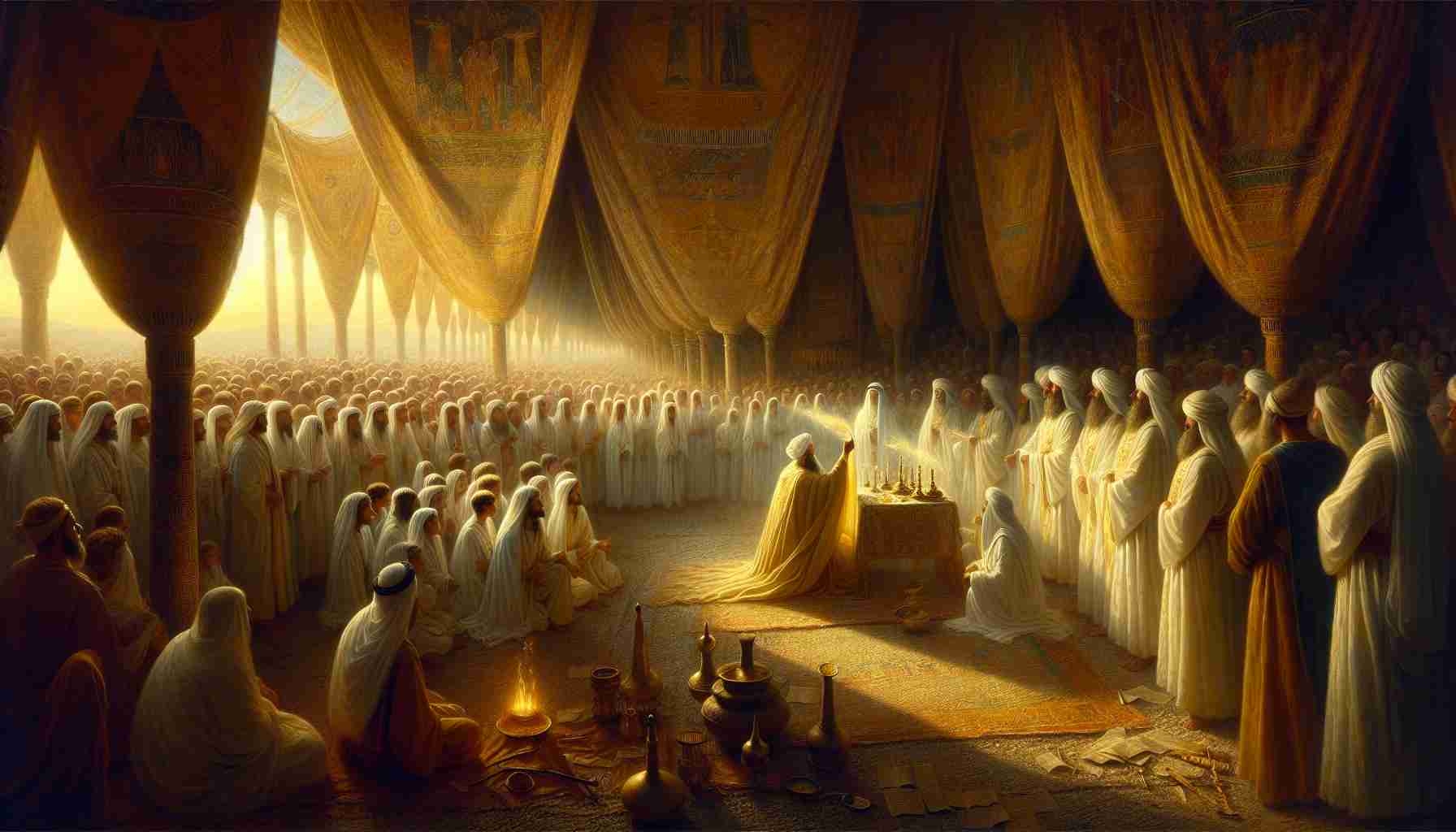

My name isn’t written anywhere in the Torah, but my hands helped prepare the sacred oil.
I was a servant to Elazar, one of Aaron’s sons. Elazar was one of the first kohanim—priests of Israel. When I was assigned to help him, I was just fifteen. I knew nothing about holy service or the weight that came with it. I only knew how to follow orders, how to grind sweet spices, and how to keep quiet.
The day of the consecration ceremony arrived. Moses had gathered all of Israel at the entrance to the Tent of Meeting. That's what we called the mishkan—the holy dwelling we built for God in the wilderness. The air was thick with dust and uncertainty. I stood behind the curtain, watching as Elazar stood beside his father, Aaron, whose face was both serious and trembling.
Moses took the shining garments, one by one, and dressed Aaron in them—first the tunic, then the sash, then the robe and breastplate studded with stones. I thought to myself, “How heavy it must be to wear something so holy.”
Then came the oil.
That morning, I had helped carry the small horn of oil from the mixing tent. It was made according to God’s command—pure olive oil blended with special spices. The scent alone made your hands feel clean. I watched as Moses poured it on Aaron’s head, and it streamed down his beard like golden threads. In that moment, something shifted in the air.
Elazar turned his eyes toward me as if to say, “Do you see this? Do you understand what we’re stepping into?” I didn’t. Not yet.
The sun blazed above us, but it was that oil that burned in my mind. From then on, Elazar and his brothers were different. They ate only holy foods, avoided all impurity, and stayed inside the Tent entrance for seven days, just like God had instructed. I brought them bread and meat, but they didn’t talk much. They were with God now. Set apart.
On the fifth day, I whispered to Elazar through the curtain, “Are you afraid?”
He answered softly, “It is not fear. It is knowing I must never forget who I serve.”
That stayed with me.
Years later, after my service ended, I became a spice merchant. I traveled far, traded well, and raised a family. But I never forgot that oil. Not its scent. Not its shine. And not what it did. It turned men into servants of the Most High—people chosen not for power, but for holiness.
Sometimes I tell my sons, “Greatness isn’t in robes or titles. It’s in saying yes to God—even when it costs everything.”
Because I was there when holiness was poured—not just on heads, but into hearts.
My name isn’t written anywhere in the Torah, but my hands helped prepare the sacred oil.
I was a servant to Elazar, one of Aaron’s sons. Elazar was one of the first kohanim—priests of Israel. When I was assigned to help him, I was just fifteen. I knew nothing about holy service or the weight that came with it. I only knew how to follow orders, how to grind sweet spices, and how to keep quiet.
The day of the consecration ceremony arrived. Moses had gathered all of Israel at the entrance to the Tent of Meeting. That's what we called the mishkan—the holy dwelling we built for God in the wilderness. The air was thick with dust and uncertainty. I stood behind the curtain, watching as Elazar stood beside his father, Aaron, whose face was both serious and trembling.
Moses took the shining garments, one by one, and dressed Aaron in them—first the tunic, then the sash, then the robe and breastplate studded with stones. I thought to myself, “How heavy it must be to wear something so holy.”
Then came the oil.
That morning, I had helped carry the small horn of oil from the mixing tent. It was made according to God’s command—pure olive oil blended with special spices. The scent alone made your hands feel clean. I watched as Moses poured it on Aaron’s head, and it streamed down his beard like golden threads. In that moment, something shifted in the air.
Elazar turned his eyes toward me as if to say, “Do you see this? Do you understand what we’re stepping into?” I didn’t. Not yet.
The sun blazed above us, but it was that oil that burned in my mind. From then on, Elazar and his brothers were different. They ate only holy foods, avoided all impurity, and stayed inside the Tent entrance for seven days, just like God had instructed. I brought them bread and meat, but they didn’t talk much. They were with God now. Set apart.
On the fifth day, I whispered to Elazar through the curtain, “Are you afraid?”
He answered softly, “It is not fear. It is knowing I must never forget who I serve.”
That stayed with me.
Years later, after my service ended, I became a spice merchant. I traveled far, traded well, and raised a family. But I never forgot that oil. Not its scent. Not its shine. And not what it did. It turned men into servants of the Most High—people chosen not for power, but for holiness.
Sometimes I tell my sons, “Greatness isn’t in robes or titles. It’s in saying yes to God—even when it costs everything.”
Because I was there when holiness was poured—not just on heads, but into hearts.